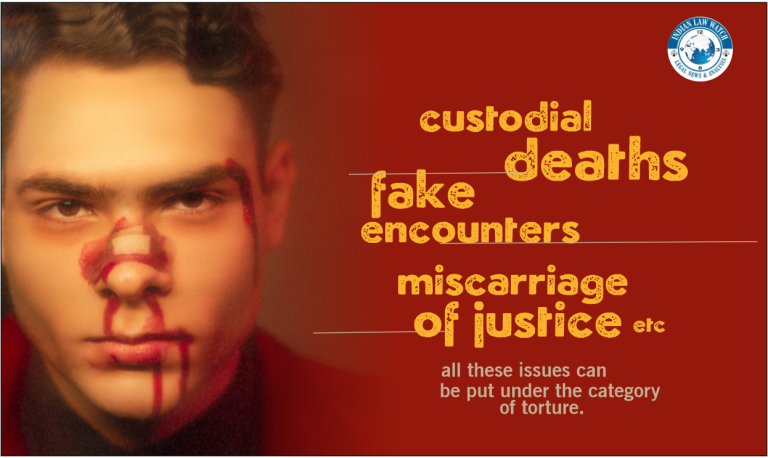
Basis of preparing the report: Reference from Delhi High Court
The Delhi High Court, in the case Babloo Chauhan @ Dabloo v. State Government of NCT Delhi, expressed grave concerns about wrongful prosecution and incarceration of innocent persons. The court highlight the need for a legislative framework for providing relief to such persons.
The court observed that
“There is at present in our country no statutory or legal scheme for compensating those who are wrongfully incarcerated. The instances of those being acquitted by the High Court or the Supreme Court after many years of imprisonment are not infrequent. They are left to their devices without any hope of reintegration into society or rehabilitation since the best years of their life have been spent behind bars, invisible behind the high prison walls”
In many cases the Supreme Court held that compensation can be awarded by constitutional courts for violation of fundamental right under Article 21 of the Constitution of India. These have included instances of compensation being awarded to those wrongly incarcerated as well. But these are episodic and are not easily available to all similarly situated persons. The Delhi High Court vide its order dated 30 November 2017, call law commission of India to undertake the examination of “relief and rehabilitation to victims of wrongful prosecution, and incarceration”.
Australian online casinos are regulated by the government, which ensures that they operate in a fair and transparent manner. This also means that players can trust these sites with their personal and financial information.
1. Standard of miscarriage of justice
For lying down the legal framework for addressing miscarriage of justice, we have to identify what should constitute “wrongful‟. Whether the standard of miscarriage of justice should be wrongful prosecution, incarceration, conviction.
- wrongful conviction: law of compensation for miscarriage of justice of many Western countries (including the federal and state laws in the United States, Canada, Germany etc.) recognize miscarriage of justice as resulting in „wrongful conviction‟ by virtue of a final order, after all avenues of appeal have been exhausted and a new fact surfaces which then proves conclusively that the convicted person was factually innocent, and only in such case does the claimant qualify for the relief of compensation.
The abovementioned standard is not appropriate due to following reasons;
- This standard does not cover forms of miscarriage of justice that an accused person may suffer even if they are eventually acquitted.
- in India it is difficult to prove “new fact proving factual innocence” post the (final) conviction as the chances of DNA based evidence contributing towards
The exoneration of innocents are very limited.
- This standard excludes claims of compensation in cases where the conviction was partly or wholly attributable to the accused person.
- Wrongful incarceration: This standard would invoke miscarriage of justice in all cases of acquittals where the person has spent some or substantial time in prison i.e. all cases with long-drawn trials resulting in acquittals.
This standard in application would be both over-inclusive and under-inclusive. this standard would include each of the cases where the person was incarcerated for whatever amount of time and was later found to be not guilty. A corollary of the foregoing would be relief being granted to those who may be factually guilty, but were acquitted for procedural reasons such as witness turning hostile etc.
- Wrongful prosecution: This standard identifies miscarriage of justice as police or prosecutorial (procedural) misconducts resulting in malicious or negligent investigation or prosecution of an innocent person.
This standard is based on a finding that the accused was not guilty of the offence, but the police and/or prosecution engaged in some form of misconduct in investigating, charging and/or prosecuting the person.
In the Indian context, the standard of wrongful prosecution should be the most effective for identifying the cases of miscarriage of justice as it directly targets procedural and other police and prosecutorial misconducts, which appears to be one of the primary sources of factual errors that results in innocent people being held guilty of offences they did not commit.
What amounts to Wrongful Prosecution?
Wrongful prosecution, are the cases of miscarriage of justice where procedural misconducts – police or prosecutorial, malicious or negligent – resulted in wrongful prosecution of an innocent person, who was ultimately acquitted, with a court making an observation or recording a finding to that effect.
The list of procedural misconduct would include the following:
- Making or framing a false or incorrect record or document for submission in a judicial proceeding or any other proceeding taken by law;
- Making a false declaration or statement authorized by law to receive as evidence when legally bound to state the truth – by an oath or by a provision of law;
- Otherwise giving false evidence when legally bound to state the truth – by an oath or by a provision of law;
- Fabricating false evidence for submission in a judicial proceeding or any other proceeding taken by law
- Destruction of an evidence to prevent its production in a judicial proceeding or any other proceedings taken by law
- Bringing a false charge, or instituting or cause to be instituted false criminal proceedings against a person;
- Committing a person to confinement or trial acting contrary to law.
Conclusion
From the landmark cases of Rudal Sah , Nilabati Behera , D. K. Basu to the 2016 case of Dr. Rini Johar , the Supreme Court has recognised the remedy of recovering appropriate damages from the State as one of the telling ways in which the violation of fundamental rights can be prevented. But despite decades of jurisprudence on compensation under public law, there is no set legislative principle regarding the basis for determining the award of compensation or its amount thereof.
Also there needs to be compensatory assistance by the State to help the innocent victims of miscarriage of justice, who have suffered through wrongful prosecution, to rehabilitate and to adjust to the life-after, and to reintegrate into society.
Today there is a pressing need for an explicit law for compensating the victims who have suffered miscarriage of justice at the hands of the State machinery – laying down State’s statutory obligation to recompense these victims of wrongful prosecution, and a dedicated judicial mechanism to give effect to the same.
Photo by Chris Lawton on Unsplash





